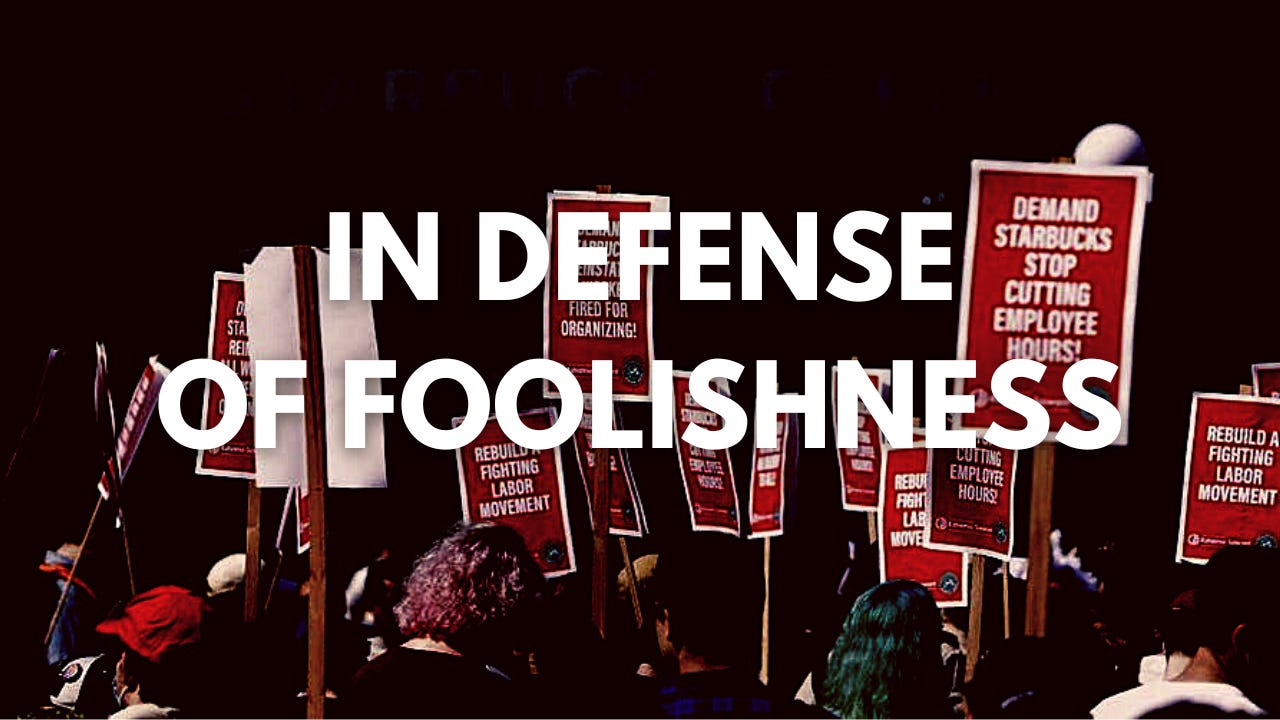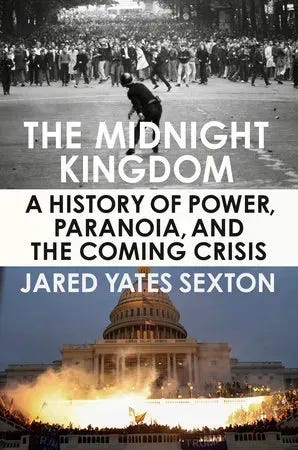In Defense of Foolishness
Creating a better world depends on risking everything, including appearing foolish in believing a better world is possible
This past Friday evening I had the distinct pleasure of delivering the keynote address for the 26th annual Parkland Institute Conference in Alberta, Canada. For those unfamiliar, the Parkland Institute is a body dedicated to strengthening democracy and bettering the lives of people through effective and generous programs, and the theme of their conference this year was “Doing Democracy Better: Challenging the Politics of Fear and Resentment.” Considering my own political views and the mission I feel I am being called to, the topic was near and dear to my heart.
In the address above, I attempted to define the problem of our modern crisis as the consequences of Neoliberalism and the political fallout of the world’s most powerful and wealthy people redistributing tens of trillions of dollars from the working and middle-classes into their pockets while systematically dismantling government as an impediment to their continued accumulation of capital. What has happened, as we know, is the creation of a world in which power feels so far outside of our grasp that conspiracy theories have grown in power, scope, and their ability to radicalize, an unfortunate state that has been taken advantage of by charlatans and authoritarians funded by the same wealth class that created the problem in the first place.
Undoubtedly, as a subscriber to this Substack and a listener to my podcast or readers of my books, you understand this situation. I have spent the last six years of my life, ever since I suddenly became a public figure covering the Donald Trump campaign in 2016, documenting exactly what has happened through my research and production. It has been my focus, as an educator, to communicate specialized knowledge that has been largely siloed within the academy to a larger audience so that awareness can spread and actions can be taken.
As I said on my most recent Bourbon Talk, my focus is shifting a bit. I’m still going to spend a good deal of my time educating, spotlighting the problem, explaining how we have arrived here and such, but I also am working now to advocate solutions and possibly play a role in the solution myself in any way that I can. And, because of this, I want to discuss Foolishness.
In the speech at Parkland I got into this subject, making sure to point out that one of the worst things we often imagine is being seen as a fool. It makes us unserious. It makes us vulnerable. It gives others power over us, or at least it seems too. And in a harsh world full of authoritarian energies, conmen, brutish thugs, and schemes for control and power, it has always been necessary to protect ourselves. To remain evervigilant. To be self-reliant and strong.
But the answer to our problems, the solution to this crisis, relies on somehow, some way, managing to chance the possibility of being considered a fool and rebuilding a sense of hope that things might actually improve. It’s this hope, this faith even, that has made it possible before to change the world and carry out revolutions. The latter depends on it. And ensuring that you, the people you love, your communities, and your family have a future free of oppression and want and precarity and exploitation depends on healing from the weaponized trauma of Neoliberalism, healing from the paranoid abuses of the Right Wing and the base they represent, and healing from the notion that we are alone, powerless, and that the world can never change.
Foolishness is the key.
Neoliberalism has managed to take over the world and define our reality because it is intentionally antithetical to foolishness. When stagflation troubled the New Deal Consensus in the 1970’s, it was forwarded that only calm, cool, specialized technocrats could engineer our way out of the problem. It meant removed leadership. It meant the undermining of populist and mass politics, which rely on emotions and solidarity and passion, and their replacement by bloodless rationality.
Neoliberals believed they could not harbor vulnerable human concerns. The economy and the crisis necessitated seemingly brutal cuts. Social services were slashed. Safety nets destroyed. Entire ways of life, traditions, and identities were wiped from the face of the Earth. It didn’t matter if it hurt. It didn’t matter if it wounded.
The situation required it.
This is the essence of both Liberalism and Capitalism, which combine into the form of Neoliberalism from which we are attempting to escape. Liberalism, with its protection of property over all, is not necessarily antithetical to democracy but relentlessly wary of it and in struggle. Capitalism is designed to be motivated by selfishness, a means of capturing the ugliest aspects of humanity and using them for profit and so-called progress. Neoliberalism is a return to these principles which “suffered” from the rise of both democracy and the New Deal Consensus. It is a reshuffling of the deck, so to speak, with an emphasis on removing the emotional and the empathetic.
And, what’s more, Neoliberalism and authoritarianism both, as a matter of course, attempt to paint a world in which there are no alternatives. The infamous “End of History” was not about an apocalypse, so to speak, but the closing of a window to any alternatives. It was about assuring people that, no matter how inhumane and often unbearable the Neoliberal world might be, what with all of its cruel austerity and harsh discipline, there was no chance of anything better.
To defeat it, and create that better future, we will first have to dream a better future. The rationality of Neoliberalism assures us that is absurd. Look around you. The machinery of power is too large. The systems too complicated. Too extensive. They flow around the world and back and possess so much wealth and are imbued with so much control that you, a single, solitary person simply trying to make ends meet, could not possibly ever trouble any of it. Hell, the elections you vote for, the politicians you depend on, do hardly anything on your behalf. Even representative democracy has been coopted.
The best you can do is take care of yourself.
The best you can do is possibly crawl over someone else to ensure that you get what little you can get.
But that will get us nowhere. It gives Neoliberalism and authoritarianism what they need to continue to grow and seize more and more of the world and our world. Our inner spaces. Our minds and more importantly our hearts.
I recognized this might sound foolish. It is so much easier to discuss vote totals. To spend thousands of words analyzing bills and proposals. I am a Midwestern guy. I’ve rolled my eyes more than a few times at things that sound like this, that even tiptoe into this uncharted territory. But I also know, deep down, after studying the problem, examining it from every angle, and living and breathing and this fight now for years, that this is the answer. It is a renewal of faith and love and, above all, hope. It is about crafting a new spirituality that isn’t necessarily tethered to religion, but could be depending on the denomination and philosophy.
It’s about chancing looking the Fool.
It’s about putting ourselves out there and risking being hurt and crushed and tossed aside.
It’s about starting to live on our terms again and evicting these inhuman, traumatic forces from our heads and rediscovering that their visions of selfishness and greed and cruelty were just projections of their own vices and shame.
We understand the problem and we will continue studying it for information, for examples, and for strategic purposes. Because we will win. We will make a better future. But the next step is to become the solution regardless of how foolish it might seem.






My husband and I took our kids to a protest yesterday and the sign I made read: “A better world is possible.”
Cheers, to a better world. 🍻
The people, as a whole, have been so intentionally blinded by the forces of neoliberalism that your earlier depictions of the problem we are facing was and is necessary to shock us into seeing just how serious the problem really is.
But it’s also very depressing.
I am extremely heartened to see you shift into the solutions phase of your research. I’m also heartened to see that you are not entirely discounting religion as a force for good in society. Neoliberalism and authoritarianism are so strong we need every tool in our toolbox, and every possible course of Power to have a hope of defeating them. Nothing should be left out.